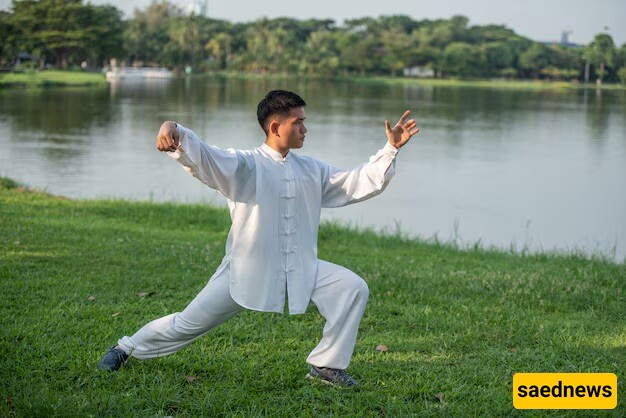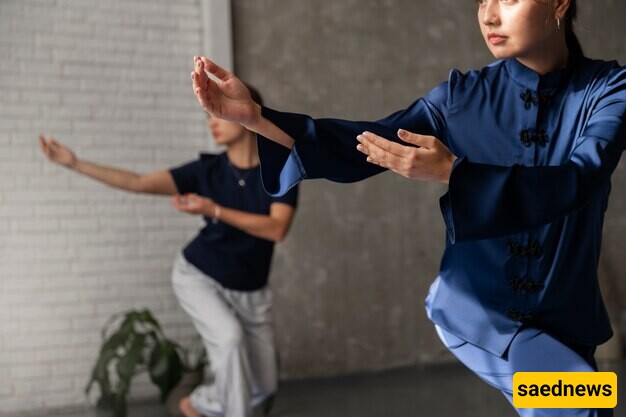Tai Chi is an incredibly remarkable exercise, and it also has positive effects on health, all of which you will learn about here. Stay with us at Saed News.

Tai Chi has existed since ancient China, and its common 12-week practice has been carried out for over 1000 years. This practice includes deep breathing and both fast and slow movements, making it suitable for people of all body types. In this martial art, the emphasis is on nurturing the mind rather than muscles because the mind can extend beyond the limitations of time and space to infinity. Recent research has shown that this exercise can serve as a supplement in the treatment of depression and is considered a form of therapeutic exercise. Researchers believe that for individuals who avoid seeing a psychiatrist, Tai Chi can be very effective for them.
Studies published in the Journal of Psychiatry report that 50 patients were studied, with 17 in the Tai Chi group, 14 in a stress and depression-reduction discussion group, and 19 in a control group. After 12 weeks, evaluations showed that the Tai Chi group had greater improvements than the other groups.

The beneficial effects of Tai Chi exercises, such as mental focus, calmness, strengthening the nervous system, treating chronic, severe, and even genetic diseases, improving blood circulation, improving lung function, etc., will be explored in this section. Tai Chi is a very interesting and enjoyable art form, and even better, it’s easy to practice. The equipment and space requirements are minimal, and the exercises can be done almost anywhere. Most importantly, the benefits of Tai Chi are evident to anyone who participates.

Tai Chi helps improve the mood of individuals who are depressed or anxious. Early studies show that consistent and continuous practice of Tai Chi can reduce symptoms of anxiety and depression. Researchers believe that mindful breathing and slow movements can have a positive effect on the nervous system and regulate mood. More research is needed to confirm a deeper connection between Tai Chi and mood improvement.
Regular Tai Chi practice can improve sleep quality. One study examined young adults with anxiety who participated in two Tai Chi classes per week for 10 weeks. According to the report, individuals who practiced Tai Chi had better sleep quality compared to the control group. This group also reported lower anxiety levels. Tai Chi can also improve sleep quality in older adults. In a 2016 study, researchers found that two months of Tai Chi practice, twice a week, could improve sleep in older adults with cognitive disorders.
Regular Tai Chi practice can help with weight loss. One study tracked changes in weight in a group of adults who practiced Tai Chi five times a week for 45 minutes. At the end of 12 weeks, these adults had lost more weight without any changes in lifestyle.
Tai Chi can improve motor function and balance and reduce the fear of falling in older adults. After 8 weeks, it can lower the risk of falling, and after 16 weeks, this effect is even stronger. Since the fear of falling can reduce independence and quality of life, Tai Chi offers significant benefits for improving these individuals' lives. Tai Chi can also improve cognition in older adults with cognitive disorders. More importantly, Tai Chi can help improve memory and functional skills such as attention and performing difficult tasks.
Tai Chi has been shown to offer significant benefits in areas like balance, lower muscle strength, endurance, and flexibility, especially in older adults. In one study, participants in their 60s and 70s practiced Tai Chi three times a week for 12 weeks. They also underwent several fitness tests to measure balance, muscular endurance, stamina, and flexibility before and after 12 weeks. Significant improvements were observed in balance, muscular endurance, stamina, and flexibility after six weeks, with further improvements after 12 weeks.
Unlike many other forms of exercise, Tai Chi is not a fleeting trend. This exercise has been practiced in China for over a thousand years. Depending on the speed and size of the movement, Tai Chi can provide some aerobic benefits. Tai Chi is a gentle art, so people of almost any age or physical condition can practice it. In fact, many prominent Tai Chi instructors continue teaching well into their later years. If a clinical specialist recommends a more intense exercise than Tai Chi, you might also need to incorporate some aerobic exercises. Focusing on proper breathing techniques makes Tai Chi especially beneficial for asthma patients.
Over time, aerobic capacity declines, but research on traditional aerobic exercises has shown that it can improve with regular training. In one meta-analysis, researchers reviewed seven studies on the effects of Tai Chi on aerobic capacity in adults with an average age of 55 years. The researchers found that individuals who practiced Tai Chi regularly for a year had higher aerobic capacity than sedentary individuals of the same age.
Fibromyalgia is one of the most common musculoskeletal disorders, associated with high levels of health issues and very painful symptoms. The cause of fibromyalgia (FM) is unknown, and there is no known cure. A study involving 39 subjects with fibromyalgia, conducted over six weeks, showed that FM symptoms and health-related quality of life improved after the study. This could be great news for many others suffering from this condition.
Walking speed decreases over time, and research shows it may be associated with an increased risk of falling. However, one study showed that people who practiced Tai Chi were significantly faster than those who did not.
The breathing, movement, and mental focus required for Tai Chi help participants relax. The mind-body connection is crucial here, as it is reported that breathing, combined with body movements and eye-hand coordination, promotes relaxation. Tai Chi can increase both upper and lower body flexibility as well as strength.
Many common exercises place joints such as the shoulders, knees, and back into unusual, repetitive, and unnatural movements. As a result, many active people eventually experience joint problems. However, classical Tai Chi, through generations of professional practitioners from childhood to late life, fully understands the importance of proper movements and stances to protect and strengthen joints during long-term, repetitive exercises.
The twisting and bending movements, along with breathing and meditation components, massage the internal organs and relieve them from the damage caused by stress, poor posture, and difficult work conditions. It also aids in gas exchange in the lungs and improves the digestive system’s function. Tai Chi is gentle and does not restrict breathing while addressing key fitness components such as strength, flexibility, balance, and, to a lesser extent, aerobic exercises.
Tai Chi can improve both lower and upper body strength. Regular Tai Chi practice, combined with resistance training and brisk walking, can be comparable. Although you don’t work with weights or resistance bands, unsupported arm exercises in Tai Chi strengthen the upper body. Tai Chi strengthens both lower and upper limbs, as well as the core muscles of the back and abdomen.
According to some studies, Tai Chi improves balance, and based on other studies, it reduces it. Tai Chi helps train one's sense, which involves sensory neurons in the inner ear and stretch receptors in the muscles and ligaments. Tai Chi also improves muscle strength and flexibility. Some studies have shown that Tai Chi training helps reduce fear.
Tai Chi can reduce some symptoms of chronic obstructive pulmonary disease (COPD). In one study, individuals with this disease practiced Tai Chi for 12 weeks. At the end of the study, these individuals reported better physical ability and improved quality of life.
In a randomized controlled trial of 195 individuals, regular Tai Chi practice reduced the number of falls in people with Parkinson’s disease. Tai Chi helps these individuals improve leg strength and overall balance. So, by practicing Tai Chi, you can manage Parkinson’s disease and improve your health.
When compared to physical therapy, Tai Chi has been found to be a more effective treatment for osteoarthritis. If you have arthritis, always consult your doctor before starting Tai Chi exercises. You may need modified versions of certain movements. Tai Chi is a safe form of exercise for individuals with coronary artery disease. Regular Tai Chi practice can help with the following:
Increases physical activity
Aids in weight loss
Improves quality of life
Reduces arthritis pain
In a study conducted in 2015, 15 participants with rheumatoid arthritis practiced Tai Chi for 12 weeks. At the end of the study, the participants reported less pain and better balance and movement. Larger studies conducted earlier have shown similar results in individuals with knee osteoarthritis. In this study, 40 participants with knee osteoarthritis performed 60-minute Tai Chi sessions twice a week for 12 weeks. The participants experienced reduced pain and improved movement and quality of life.
I hope you enjoyed this therapeutic exercise content. Feel free to share it with your loved ones! Also, for more in-depth content, visit Saad News’ Lifestyle section. Thank you for being with us!

